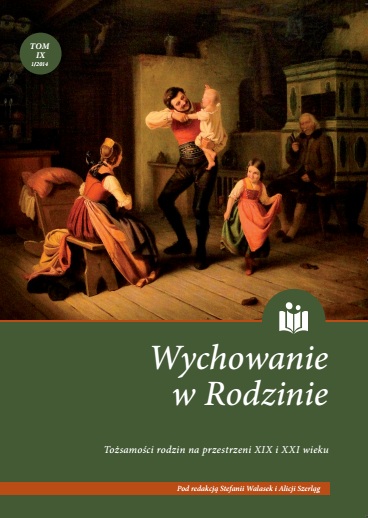Więzy rodzinne i relacje międzypokoleniowe w rodzinach
europejskich w XX wieku
Więzy rodzinne i relacje międzypokoleniowe w rodzinach
europejskich w XX wieku
Author(s): Marie MarečkováSubject(s): History, Social Sciences, Sociology, Family and social welfare
Published by: Zakład Historii Edukacji w Instytucie Pedagogiki Uniwersytetu Wrocławskiego
Keywords: kinship ties; rural societies; elderly people; professional mobility; nuclear family; welfare state; cisis; center of security
Summary/Abstract: Intergenerational family relationships still performed an important social function in rural society in Europe at the beginning of the twentieth century. The situation within the Czech family illustrates the current problems in family ties and intergenerational relationships that have surfaced since the nineteen nineties. Negative developmental trends are being seen, particularly in comparison with family circumstances in other European countries, most significantly the continuing ageing of the population and the wide-ranging activities of seniors. Looser relationships with their families and a decline in their engagement in caring for their grandchildren mean that Czech grandparents tend to rank alongside more socially developed countries in this respect. Under Czech conditions, however, this can lead to great strain on the active roles played by seniors. The growing number of adult offspring, particularly men, living with their parents is a far from progressive trend in social and economic development, and corresponds more closely with southern European traditions. A preference for alternative forms of cohabitation, particularly among partners with primary education, the postponing of the birth of the first child, the growth in the number of single-person households and, perhaps most importantly, the enormous rise in the number of households comprised of young or middle-aged individuals in the economically productive age group may, it istrue, rank the Czech Republic among socially developed countries and at around the European average, though in view of the unfavourable demographic trend a fundamental change in state support for marriage and the family is, however, also essential in the Czech Republic. The fact is that more than a third of families with children are threatened with poverty. The conclusion arising from the analyses performed indicates that the current problems in state social and family policy are reflected in the increasing importance of the family and the fact that it can not be replaced by public institutions. At the end of the twentieth century, the family is again becoming the focus of certainty and material security, and intergenerational solidarity remains an important traditional value.
Journal: Wychowanie w Rodzinie
- Issue Year: IX/2014
- Issue No: 1
- Page Range: 15-21
- Page Count: 7
- Language: English, Polish

